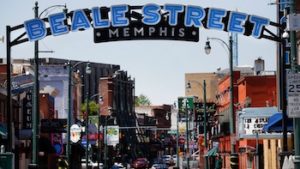
*On this date in 1841, Beale Street is celebrated. Beale Street is a historic street in Downtown Memphis, Tennessee, which runs from the Mississippi River to East Street, approximately 1.8 miles.
Beale Street was created by entrepreneur and developer Robertson Topp, who named it for a forgotten military hero. (The original name was Beale Avenue.) Its western end primarily housed shops of trade merchants, who traded goods with ships along the Mississippi River, while the eastern part developed as an affluent suburb. In the 1860s, many black traveling musicians began performing on Beale. The Young Men's Brass Band in 1867 was the first to call Beale Street home.
In the 1870s, the population of Memphis was shaken by a series of yellow fever epidemics, leading the city to forfeit its charter in 1879. During this time, Robert Church purchased land around Beale Street, eventually becoming an early Black millionaire from the South. In 1890, Beale Street underwent renovation with the addition of the Grand Opera House, later known as the Orpheum. In 1899, Church paid the city to create Church Park at the corner of 4th and Beale. It became a recreational and cultural center where blues musicians could gather.
A major attraction of the park was an auditorium that could seat 2,000 people. Speakers at the Church Park Auditorium included Woodrow Wilson, Booker T. Washington, and Franklin D. Roosevelt. Beale Street Baptist Church, Tennessee's oldest surviving Black Church edifice, is located on the street. Ida B. Wells’ anti-segregationist paper, Free Speech, was based on Beale before her presses were destroyed by a white mob. It is a significant location in the city's history and blues music history.
Today, the blues clubs and restaurants that line Beale Street are major tourist attractions in Memphis. Festivals and outdoor concerts frequently bring large crowds to the streets and surrounding areas.